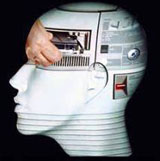|
 The reason people exist at all is because of two
important things, memory and language, which have been vital in the
evolution of humanity. As an example, our ancestors needed language
to explain how to light a fire to keep their caves warm, and a
memory to remember how to do it. So we have a memory because if we
didn't we would never have evolved far enough for you to ask this
question in the first place! The reason people exist at all is because of two
important things, memory and language, which have been vital in the
evolution of humanity. As an example, our ancestors needed language
to explain how to light a fire to keep their caves warm, and a
memory to remember how to do it. So we have a memory because if we
didn't we would never have evolved far enough for you to ask this
question in the first place!
So, how does it work? Well the processes involved in human memory
are very complex. People sometimes compare the human brain to a
computer, and memory to floppy discs, but this is a bit misleading.
Despite big advances in recent years memory is still a bit of
mystery, and there are disagreements among the experts about exactly
what is going on.
Memory is seen as a function of the brain and is defined as the
ability to store and retrieve information. But there is no
particular bit of the brain which is thought to be where data is
stored. Many people think that there are different types of memory,
after all there are lots of different types of input, so we get visual
memory, auditory memory, olfactory memory, gustatory and
tactile memory. And we tend not to
remember things as single, simple bits, but in a more complex way.
So you may remember the first time you had, say, a very hot chili con carne, but not just that simple
fact, you'd find you'd remember it as part of a more complex set of
things. So you'd probably remember that the first time you had chili
was at a friend's birthday party, when you wore green jeans. So
memory is very complex, and it doesn't seem to belong in any one
part of the brain.
But you couldn't possibly store all this complex information in
your brain, there would just be too much of it. Instead it seems
like your brain takes lots of information into your short term
memory, but then picks the most important information out of that to
go into long term memory. You can't hold information in short term
memory for very long, that's why it's called short term memory and
you can't hold very much either. So it's easy to remember an 8 digit
phone number, but any more than 12 is very difficult, Interestingly
short term memory can be disrupted by a blow to the head or an
electric shock. This rather suggests that short term memory operates
by circulating nerve impulses which can be disrupted very easily.
But nobody is quite sure how long term memory works. Because we can
remember so much information some scientists think that it must be
stored using very small things, perhaps a
protein molecule. But there are doubts about this, especially
as protein molecules live for much less time than our long term
memory lasts. Some think that memories are stored by changing the
ways brain cells link together, but it is difficult to study this in
the laboratory.
|
|
note:
|
input: 输入
visual memory: 视觉记忆
auditory memory: 听觉记忆
olfactory memory: 嗅觉记忆
gustatory memory: 味觉记忆
tactile memory: 触觉记忆
chili con carne: 辣豆汤
protein molecule: 蛋白质分子 | |